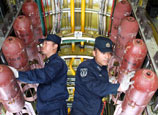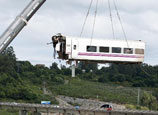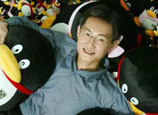
BEIJING, July 26 (Xinhua) -- The Chinese police on Thursday revealed details of GlaxoSmithKline (GSK) China's alleged bribery and tax-related violations that pushed up drug prices and disrupted market order.
Related: GSK to appoint new head for China operation
After the Ministry of Public Security (MPS) announced on July 11 that some employees from GSK China were being investigated for suspected bribery and tax-related violations, more individuals involved in the case, including salespeople and doctors, are now under investigation.
Xinhua has learned from police officers handling the case that they are suspected of offering bribes to doctors, asking them to prescribe more drugs in order to grow sales volume, and in the meantime pushing up drug prices.
OFFERING BRIBES TO DOCTORS
A man surnamed Li, 31, is a regional sales manager at GSK China in central China's Henan Province and in charge of selling respiratory drugs to more than 10 hospitals in the province's capital city Zhengzhou.
He said before taking post, a GSK China salesperson will receive special training not only on information of specific drugs, but also sales skills and methods, especially how to maintain relations with hospitals and doctors.
In a bid to start their work, pharmaceutical representatives will have 10,000 yuan (1,667 U.S. dollars) of funds, and a namelist of doctors from all around the country and files on them.
They invited doctors to join high-end academic conferences to help the practitioners increase influence in their fields. They also established good personal relations with doctors by catering to their pleasures or offering them money, in order to make them prescribe more drugs.
A 35-year-old female medical representative surnamed Wang working under Li said she entered doctors' offices to act as their assistant, and meet their needs as much as possible, even their sexual desires.
Wang said GSK China's executives already knew this, and some executives gave clear directives to the sales department to offer bribes to doctors with money or opportunities to attend academic conferences.
ECONOMIC VIOLATIONS IN DISGUISE
Police said about 7 to 10 percent of sales volume went to doctors' personal accounts. Once a doctor agrees to cooperate with GSK China, the company will establish the doctor's file and pay a bonus to the doctor based on his or her prescriptions of the firm's drugs.
For those doctors who avoid receiving money, GSK China's salespeople would invite them to academic meetings or lectures and provide them with gifts, free travel after meetings and lecture fees.
In fact, many doctors received lecture fees even when the lectures did not exist. Wang just forged lecture materials in order to obtain reimbursements from the company.
The police found that under GSK China executives' acquiescence and even encouragement in forged forms, pharmaceutical representatives reimbursed a large amount of money in the name of lecture fees, covering various expenses including travel and other entertainment, to help the company avoid legal risks.
TURNING DOCTORS TO DRUG SELLERS
Yu Fu (pseudonym), a respiratory department director of a reputable hospital (the name of which was not disclosed), became a client of Wang in 2011.
"When the GSK representative came to me, he told me their company was a leading one in the world, and attached great importance to academic activities," Yu said. "He told me the company also sponsored doctors to attend national or international conferences, covering their registration fees and travel."
Yu said, "After we got more familiar, Wang visited me at festivals, treating me to dinner and buying me gifts. When our department held events, Wang also paid the bill."
Later on, Yu recalled, Wang blatantly offered kickbacks to doctors, for example, 20 yuan (3.26 U.S. dollars) for each pack of Seretide, an asthma-treating inhaler; and 10 yuan for each dose of Flixotide, an asthma-treating spray. Wang made all doctors in Yu's department his clients.
According to Li and Wang, the company set the target of raising drug sales by 30 percent annually in the last two years, and the target can only be achieved by pushing doctors to prescribe more if there are no increases in the number of patients.
Yu said, "Generally speaking, hospitals are also inclined to prescribe more."
Wang said bribery related to expenses will push up the sale price of drugs.
On July 21, when Abbas Hussain, a president of GSK in charge of international business, met with a senior official from China's MPS, he professed GSK's plan to adjust the company's business model to cut operational costs in drug prices.
Insiders said squeezing out the bribing cost in drug prices, curbing inflationary drug costs and excessive medical care will bring tangible benefits for consumers. The clampdown provides a good opportunity to tighten supervision.
















 Migrant children’s dream of stage
Migrant children’s dream of stage


![]()
